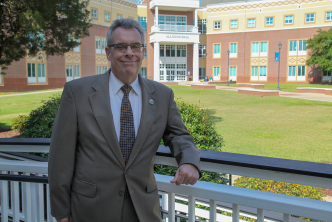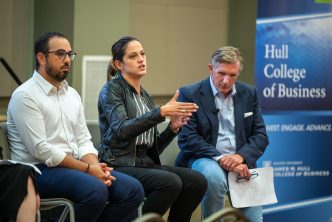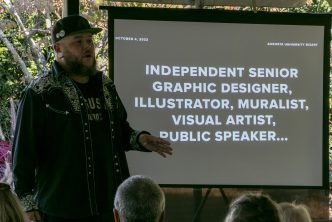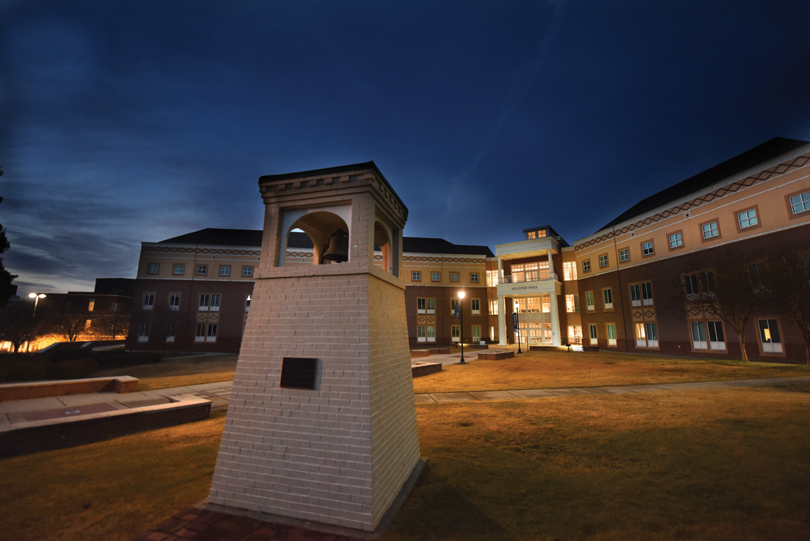Dean Richard Franza’s column appeared in the Sunday, August 15, edition of the Augusta Chronicle. The post can be viewed here.
On July 30, I attended an event that I hope will be a model for future programs that will lead to economic growth and opportunity locally, but which can also be emulated throughout our state and nation.
Gary Dennis, executive director of The Jessye Norman School of the Arts, conceived of the idea of “J-Tank,” a community-based program to assist young entrepreneurs and their families in launching businesses. The name comes from the popular entrepreneurial-themed reality TV show “Shark Tank.”
Dennis has assembled a group of sponsors, supporters and volunteers from community and governmental organizations such as the Augusta Partnership for Children, the Augusta Housing Authority, and the Downtown Development Authority of Augusta. In addition, he has garnered a business sponsorship from First Community Bank, and judging and coaching support from the Hull College of Business faculty and staff.
While Dennis’s initial goals are modest, I believe his idea has the potential to grow and sustain to have a significant impact in our community.
After the kickoff July 30, which was attended by a good number of future entrepreneurs and their families, the entrepreneurs were assigned a “pitch coach” who will assist them each Friday in August in preparation for the Pitch Competition on Sept. 18.
Three of my faculty – Drs. Mike Dugan, Dinesh Hasija and Cathy Slade – and I will serve among the judges. Those who advance from the competition will be enrolled in the “J-Tank Academy” and work with coaches, including Dr. Simon Medcalfe and me, for the next 13 weeks to help develop their ideas into viable businesses. Kudos to James Heffner and First Community Bank for providing start-up funds for these businesses.
While it will be interesting to see how many businesses come out of this program in its initial attempt, that will not be its lone measure of success. Most importantly, this program will provide an opportunity for aspiring entrepreneurs who otherwise would not have had such a chance. In addition, it will lay the foundation for hope, optimism and future opportunities for burgeoning entrepreneurs in our community.
Programs such as this demonstrate that government does not need to be the solution for what ails us. Rather, it is the responsibility of businesses and business schools such as the Hull College to partner with community organizations to make better the communities we work in and serve.
Businesses have the opportunity to choose where to make their investments rather than wait to see where the government will allocate the taxes they pay. For business schools such as Hull, our accreditor, AACSB International, wants to see us have a societal impact, and I see no better way than working with businesses and nonprofits to support our local communities.
What’s next? What can local businesses, community organizations and local government do, along with the Hull College, to improve the economic development and quality of the Augusta area? Beyond that, what can businesses, business schools and government do to improve the economic conditions of our state and the nation as a whole?
As you might expect, I have some ideas. Here are a couple that I have floated in previous columns, and I am sure our local business leaders have others.
Financial literacy programs: In my March 15, 2020, column, I indicated that our current high school and college students are under-educated in personal finance, including such areas as credit and debt; budgeting; and saving and investing. However, the argument can also be made that such under-education goes well beyond our students to include many adults.
One way in which we can improve the local economy is by ensuring our community members are fiscally astute. When I was growing up in the New York metropolitan area, a local company’s advertising slogan was, “An educated consumer is our best customer.” This slogan holds for our economic well-being as a community. The better the financial literacy of our community, the stronger economy we will have because our citizens will have a greater financial wherewithal.
I challenge our local banks, credit unions and investment service companies to join together to offer financial literacy programs in our community and the Hull College will work with you on such an effort.
Workforce development: Another important investment area for us all is workforce development. There are some great programs locally such as Textron Specialized Vehicles’ “Reaching Potential through Manufacturing” Program and the Augusta Metro Chamber of Commerce’s Students2Work Program. However, there is much more opportunity out there to develop our workforce, such as businesses investing in programming that would emulate a “national service” program that I proposed last month and in April 2019.
Such programming would definitely raise our local community, but could also be scaled throughout the state and country.
Business leaders, what are your thoughts? Are you willing to follow the lead of Gary Dennis and help make our community much better? The return on your investment would be large and I look forward to hearing from you!







